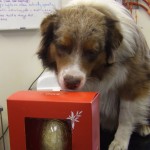The Daily Telegraph recently reported a case of a cocker spaniel who died after swallowing blue-green algae whilst swimming in Lake Windermere.
The 15 month old dog had gone for a swim near the holiday caravan where the Taras family were staying but 30 minutes later began foaming at the mouth and died. A local vet confirmed that Holly, the cocker spaniel had died after swallowing blue-green algae.
Mr Taras, of Leeds, claimed that the death could have been prevented if there had been warning signs on the lake shore. The Environment Agency did put up temporary signs after Mr Taras complained but they were not a long term measure. Mr Taras has now produced a leaflet and intends to visit Windermere, Bowness and Ambleside to warn other dog owners.
The Envirnment Agency claimed that two recent samples taken from Lake Windermere recently to test for blue-green algae were clear.
Last June two other dogs died after swimming in the lake, a four year old greyhound and a lurcher. Furthermore, a year ago, the UK’s biggest swimming competition, the Great North Swim, was cancelled due to the prevalence of blue-green algae in Windermere.
In August The Daily Telegraph reported that blue-green algae was on the rise during the Summer, with recent outbreaks in the Norfolk Broads, Pembrokeshire and East Sussex. The Environment Agency have asked the public to report blooms as the algae contain toxins that cause skin irritations and stomach upsets.
Blue-green algae: The Facts
Blue-green algae, or cyanobacteria, appears in ponds and lakes each summer although it is more common in particularly hot weather.
It tends to form in still, warm water and can have the appearance of blue-green paint or scum. Not all the blooms are poisonous but around half will produce toxins. These harmful algal blooms can kill livestock and domestic pets. Humans who ingest the bacteria are more likely to suffer no more than an upset stomach. Skin rashes, eye irritation and joint pain have also occurred in people who have swallowed or swum through it. The Environment Agency advises restricting access during a bloom and erecting signs to warn visitors.







